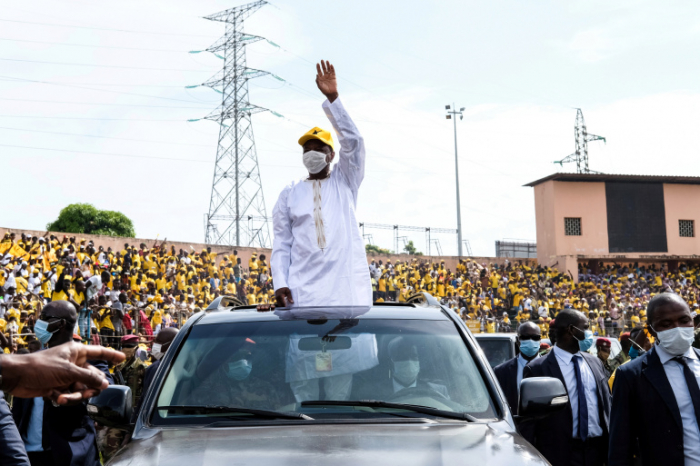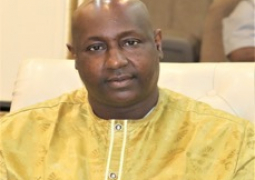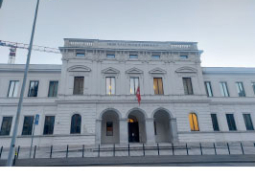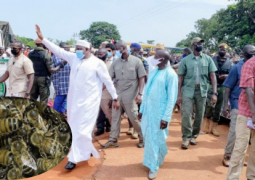
Tuesday’s announcement came a day after leading opposition challenger Cellou Dalein Diallo said he had won the first round on Sunday after suggesting the poll was rigged, comments that set a showdown with incumbent President Alpha Conde. Diallo’s claim was swiftly rejected by the electoral commission, which called it “premature” and “void”.
Addressing reporters in the capital, Conakry, Augustin Matata Ponyo, the AU’s head of mission in Guinea, said on Tuesday the ballot took place “in transparency”.
Jose Maria Neves, the head of the monitoring mission of the Economic Community of West African States (ECOWAS) regional bloc, agreed the voting process was lawful and urged candidates to “use legal channels to settle election disputes”.
Guinean opposition leader Cellou Dalein Diallo, centre, walks with supporters at his headquarters in Conakry, Guinea [Sadak Souici/AP]The government rejected allegations of rigging and said only the official electoral authority can declare the results, which are due within a week.
The commission will announce provisional results within three days of receiving the last polling-station tally. The Constitutional Court will then have eight days to declare a winner. A second round of voting, if needed, is scheduled for November 24.
‘Regrettable’
The government said in a statement on Monday that the opposition “clearly intended to create chaos and to call into question the real results”.
Meanwhile, the United Nations, AU and the 15-nation ECOWAS called the premature declaration of results “regrettable”.
“This state of affairs is not conducive to preserving calm,” they said in a joint statement.
Diallo, 68, on Monday had called on “fellow citizens who love peace and justice … to defend this democratic victory”.
But joyous celebrations from opposition supporters in Conakry quickly descended into violent clashes with security forces.
Diallo tweeted on Monday night that security forces had shot dead “three boys” and wounded several people. He blamed Conde for the “crimes”. Guinea’s government did not confirm the deaths. An AFP news agency journalist saw three injured people and heard gunfire in a Conakry suburb on Monday night.
Incumbent Alpha Conde, 82, is seeking a controversial third presidential term, a move that has triggered months of deadly unrest in Guinea [Sadak Souici/Reuters]Conde, 82, is seeking a controversial third presidential term, a move that has triggered months of deadly unrest in the country.
In March, the president pushed through a new constitution which he argued would modernise the country – but also allowed him to bypass a two-term limit for presidents.
The revamped constitution was overwhelmingly supported by voters in a referendum, although that vote was boycotted by the opposition.
At least 50 people have been killed over the past year during demonstrations against the new constitution amid a harsh crackdown by security forces, according to Amnesty International.
Rising tensions
After decades as an opposition activist, Conde became Guinea’s first democratically elected president in 2010 and was re-elected five years later, but rights groups now accuse him of veering towards authoritarianism.
Diallo was formerly a prime minister under authoritarian leader Lansana Conte. He unsuccessfully challenged Conde in both 2010 and 2015, in elections his party activists are convinced were rigged.
Before vote counting began on Sunday, Diallo’s activists said their observers had been obstructed at polling stations and alleged ballot-box stuffing.
Polling day was mostly calm after an acrimonious political campaign that saw Conde and Diallo trade insults, and was marked by violent incidents in some parts of the country.
The rising tensions had also raised the spectre of ethnic strife, with Conde accused of exploiting divisions for electoral ends – a charge he denies.
Guinea’s politics are mainly drawn along ethnic lines: the president’s base is mostly from the ethnic Malinke community and Diallo’s from the Fulani people.
In the run-up to the vote, the UN had urged candidates to curb ethnically charged hate speech, warning the situation is “extremely dangerous” and may lead to violence. SOURCE : AFP




